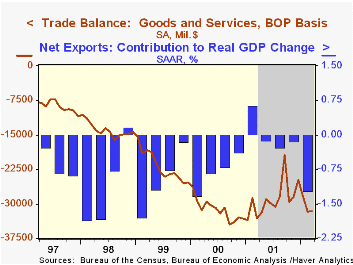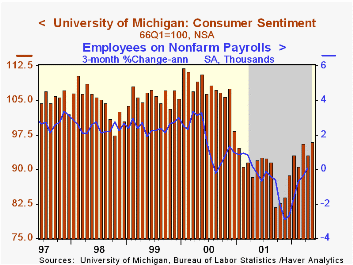 Global| May 17 2002
Global| May 17 2002U.S. Trade Deficit Deep, As Expected
by:Tom Moeller
|in:Economy in Brief
Summary
The U.S. foreign trade deficit remained near its deepest level of the last year, as expected. February's deficit was revised slightly deeper due to lowered exports. The trade deficit in 1Q averaged $30.5B versus $27.6B in 4Q. That [...]

The U.S. foreign trade deficit remained near its deepest level of the last year, as expected. February's deficit was revised slightly deeper due to lowered exports.
The trade deficit in 1Q averaged $30.5B versus $27.6B in 4Q. That degree of deterioration is slightly more than estimated in the advance GDP report where it was reported that net export deterioration sapped 1.2 percentage points from 1Q GDP growth.
Imports rose for the third consecutive month led by a 27.5% surge in the value of petroleum imports. Imports of nonauto capital goods rose slightly following two months of strong gain. Imports of nonauto consumer goods fell following two strong months and auto product imports fell for the third month in four.
Exports rose slightly but remained down 13.8% from the peak level of August 2000.
| Foreign Trade | Mar | Feb | Y/Y | 2001 | 2000 | 1999 |
|---|---|---|---|---|---|---|
| Trade Deficit | $31.6B | $31.8B | $33.1B(3/01) | $347.5B | $375.7B | $261.8B |
| Exports - Goods & Services | 0.6% | 0.6% | -10.5% | -5.7% | 11.3% | 2.6% |
| Imports - Goods & Services | 0.3% | 3.7% | -8.8% | -6.2% | 18.2% | 10.9% |
by Tom Moeller May 17, 2002

The mid-May reading of Consumer Sentiment from the University of Michigan rose unexpectedly versus April.
Sentiment rose to the highest level since late 2000.
The University of Michigan survey is not seasonally adjusted.
During the past five years there has been a 37% correlation between the level of consumer sentiment and the 3-month change in real PCE.
| Univ. of Michigan | Mid-May | April | Y/Y | 2001 | 2000 | 1999 |
|---|---|---|---|---|---|---|
| Consumer Sentiment | 96.0 | 93.0 | 4.3% | 89.2 | 107.6 | 105.8 |
Tom Moeller
AuthorMore in Author Profile »Prior to joining Haver Analytics in 2000, Mr. Moeller worked as the Economist at Chancellor Capital Management from 1985 to 1999. There, he developed comprehensive economic forecasts and interpreted economic data for equity and fixed income portfolio managers. Also at Chancellor, Mr. Moeller worked as an equity analyst and was responsible for researching and rating companies in the economically sensitive automobile and housing industries for investment in Chancellor’s equity portfolio. Prior to joining Chancellor, Mr. Moeller was an Economist at Citibank from 1979 to 1984. He also analyzed pricing behavior in the metals industry for the Council on Wage and Price Stability in Washington, D.C. In 1999, Mr. Moeller received the award for most accurate forecast from the Forecasters' Club of New York. From 1990 to 1992 he was President of the New York Association for Business Economists. Mr. Moeller earned an M.B.A. in Finance from Fordham University, where he graduated in 1987. He holds a Bachelor of Arts in Economics from George Washington University.
More Economy in Brief
 Global| Feb 05 2026
Global| Feb 05 2026Charts of the Week: Balanced Policy, Resilient Data and AI Narratives
by:Andrew Cates






